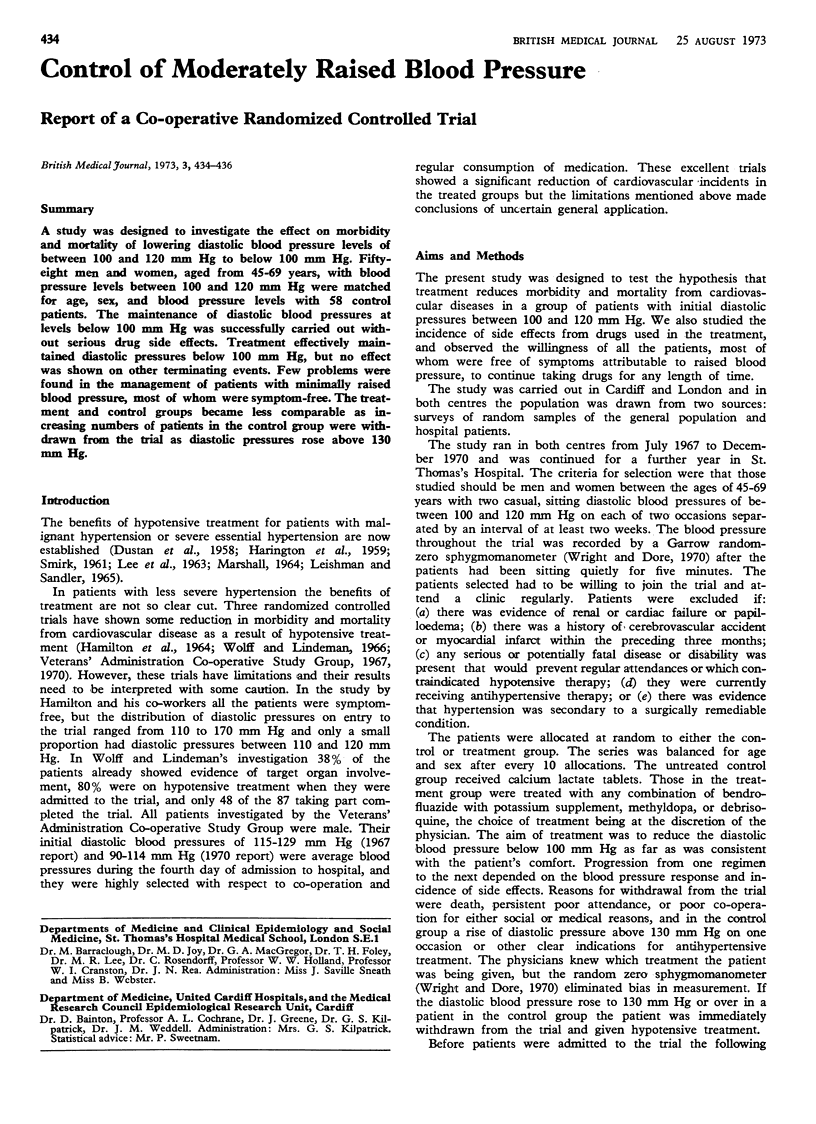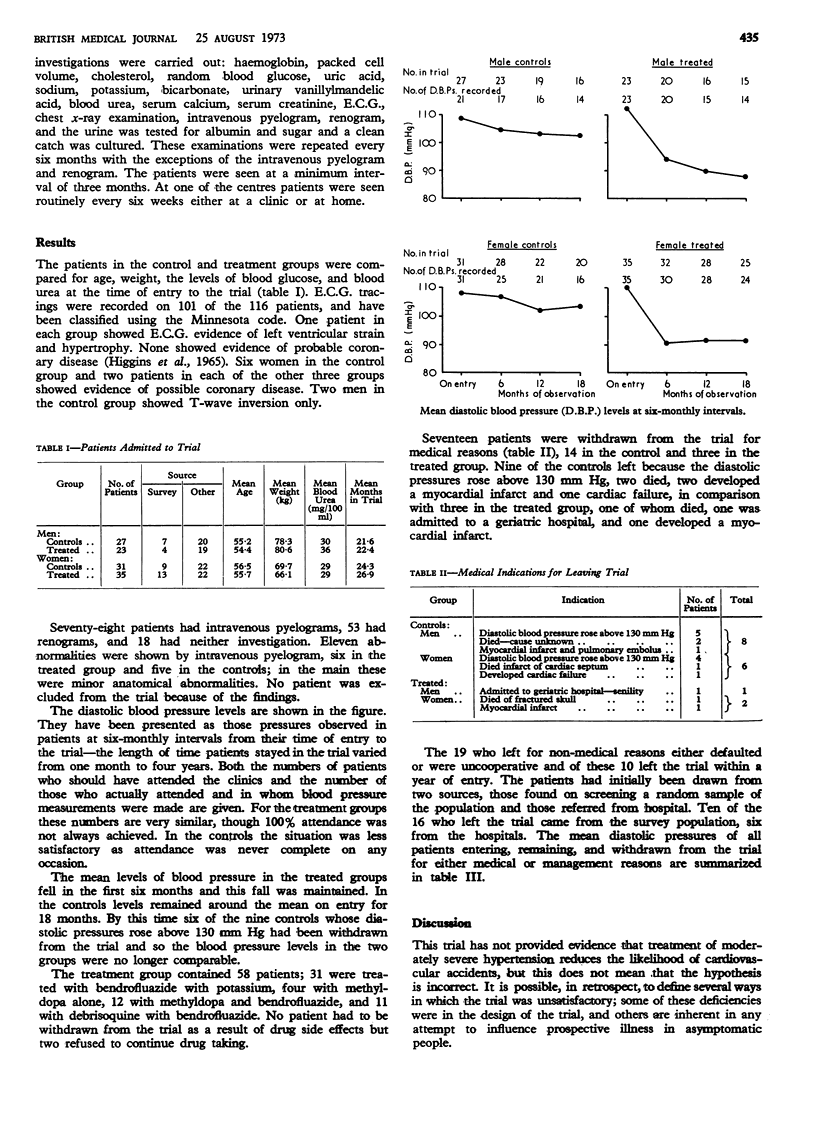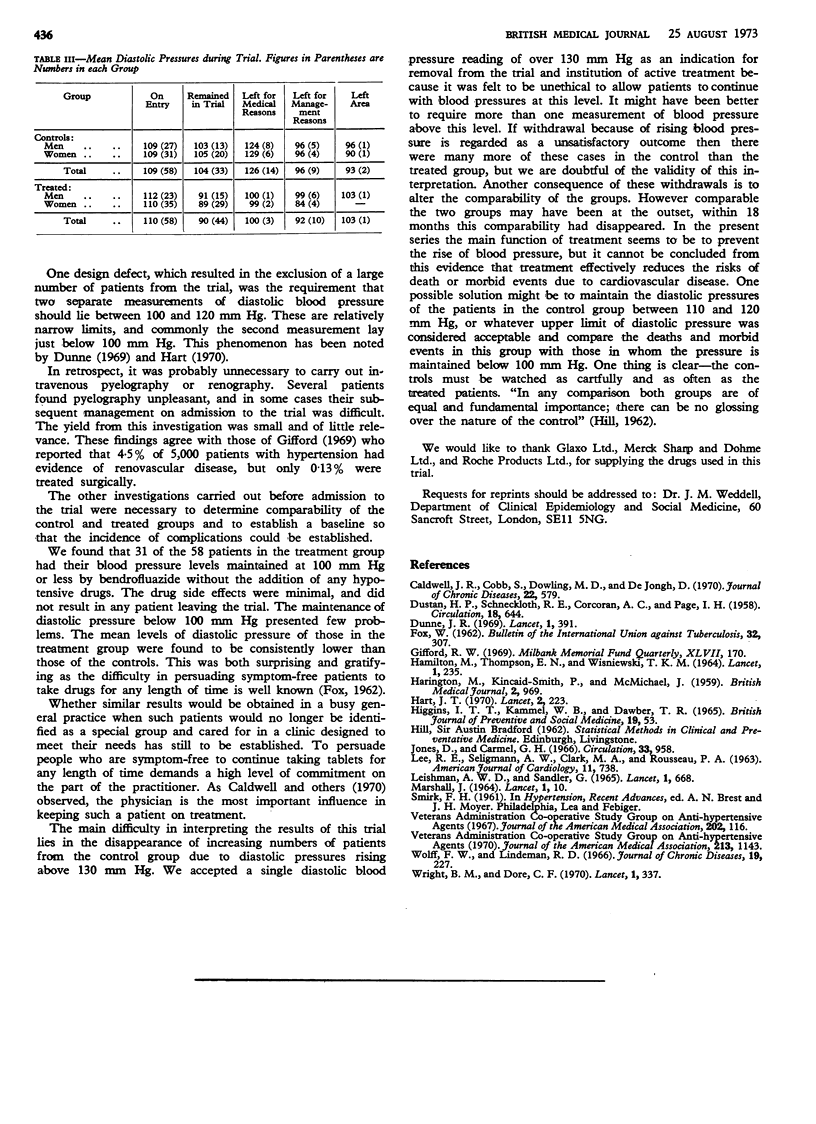Abstract
A study was designed to investigate the effect on morbidity and mortality of lowering diastolic blood pressure levels of between 100 and 120 mm Hg to below 100 mm Hg. Fifty-eight men and women, aged from 45-69 years, with blood pressure levels between 100 and 120 mm Hg were matched for age, sex, and blood pressure levels with 58 control patients. The maintenance of diastolic blood pressures at levels below 100 mm Hg was successfully carried out without serious drug side effects. Treatment effectively maintained diastolic pressures below 100 mm Hg, but no effect was shown on other terminating events. Few problems were found in the management of patients with minimally raised blood pressure, most of whom were symptom-free. The treatment and control groups became less comparable as increasing numbers of patients in the control group were withdrawn from the trial as diastolic pressures rose above 130 mm Hg.
Full text
PDF


Selected References
These references are in PubMed. This may not be the complete list of references from this article.
- Caldwell J. R., Cobb S., Dowling M. D., de Jongh D. The dropout problem in antihypertensive treatment. A pilot study of social and emotional factors influencing a patient's ability to follow antihypertensive treatment. J Chronic Dis. 1970 Feb;22(8):579–592. doi: 10.1016/0021-9681(70)90034-2. [DOI] [PubMed] [Google Scholar]
- DUSTAN H. P., SCHNECKLOTH R. E., CORCORAN A. C., PAGE I. H. The effectiveness of long-term treatment of malignant hypertension. Circulation. 1958 Oct;18(4 Pt 1):644–651. doi: 10.1161/01.cir.18.4.644. [DOI] [PubMed] [Google Scholar]
- Dunne J. F. Variation of blood-pressure in untreated hypertensive outpatients. Lancet. 1969 Feb 22;1(7591):391–392. doi: 10.1016/s0140-6736(69)91356-7. [DOI] [PubMed] [Google Scholar]
- HAMILTON M., THOMPSON E. M., WISNIEWSKI T. K. THE ROLE OF BLOOD-PRESSURE CONTROL IN PREVENTING COMPLICATIONS OF HYPERTENSION. Lancet. 1964 Feb 1;1(7327):235–238. doi: 10.1016/s0140-6736(64)92344-x. [DOI] [PubMed] [Google Scholar]
- HARINGTON M., KINCAID-SMITH P., McMICHAEL J. Results of treatment in malignant hypertension: a seven-year experience in 94 cases. Br Med J. 1959 Nov 14;2(5158):969–980. doi: 10.1136/bmj.2.5158.969. [DOI] [PMC free article] [PubMed] [Google Scholar]
- Hart J. T. Semicontinuous screening of a whole community for hypertension. Lancet. 1970 Aug 1;2(7666):223–226. doi: 10.1016/s0140-6736(70)92582-1. [DOI] [PubMed] [Google Scholar]
- LEE R. E., SELIGMANN A. W., CLARK M. A., ROUSSEAU P. A. Freedom from cerebral vascular accidents during drug-induced blood pressure reduction in "benign" hypertensive disease. Am J Cardiol. 1963 Jun;11:738–742. doi: 10.1016/0002-9149(63)90101-2. [DOI] [PubMed] [Google Scholar]
- LEISHMAN A. W., SANDLER G. HASTENING THE CONTROL OF BLOOD-PRESSURE BY GUANETHIDINE. Lancet. 1965 Mar 27;1(7387):668–670. doi: 10.1016/s0140-6736(65)91825-8. [DOI] [PubMed] [Google Scholar]
- MARSHALL J. A TRIAL OF LONG-TERM HYPOTENSIVE THERAPY IN CEREBROVASCULAR DISEASE. Lancet. 1964 Jan 4;1(7323):10–12. doi: 10.1016/s0140-6736(64)92157-9. [DOI] [PubMed] [Google Scholar]
- Wolff F. W., Lindeman R. D. Effects of treatment in hypertension. Results of a controlled study. J Chronic Dis. 1966 Mar;19(3):227–240. doi: 10.1016/0021-9681(66)90128-7. [DOI] [PubMed] [Google Scholar]
- Wright B. M., Dore C. F. A random-zero sphygmomanometer. Lancet. 1970 Feb 14;1(7642):337–338. doi: 10.1016/s0140-6736(70)90709-9. [DOI] [PubMed] [Google Scholar]


